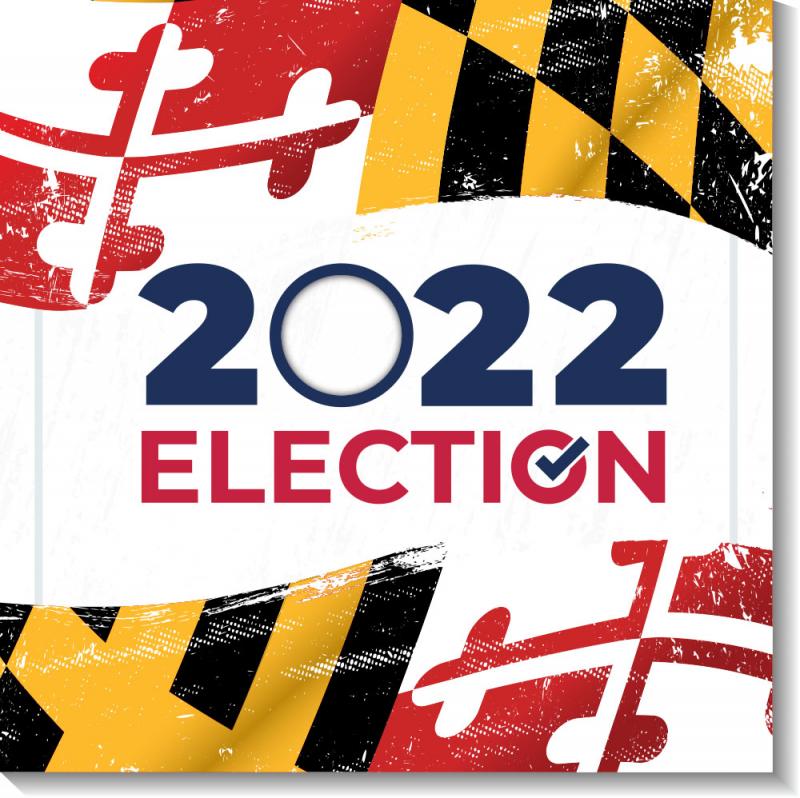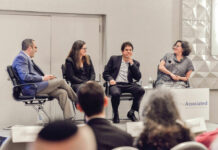
By Suzanne Pollak
More than a dozen candidates are vying to succeed Larry Hogan as Maryland’s governor, and Jewish voters have much to consider.
Jewish community professionals noted a wide range of issues that will be important to Maryland’s Jewish community in this year’s gubernatorial election. These include increasing antisemitism and security for nonprofits such as synagogues, as well as issues that impact all Marylanders, such as the economy, the environment and crime.
Harold Libit, executive director of the Baltimore Jewish Council, said the next governor should have a strong commitment to the Maryland/Israel Development Center, so that Maryland businesses have support in setting up subsidiaries in Israel, and Israeli businesses can more easily set up their businesses here.
The center has “been hugely productive, and we want to make sure the next governor appreciates it and continues it,” he said.
Security grants for synagogues and other houses of worship are also important and should continue to be funded in the current environment of hate crimes and antisemitism, Libit said.
Libit also said the next governor needs to continue BOOST (Broadening Options & Opportunities for Students Today), the scholarship program for lower-income Maryland families who want to send their children to nonpublic schools, including Jewish day schools. The next governor needs to commit to funding the public schools, as well, Libit said.
Other issues of concern include jobs, the economy and inflation, as well as climate change and crime, he said.
Ron Halber, executive director of the Jewish Community Relations Council of Greater Washington, agreed that social justice and economic issues are on the minds of many Jewish voters. These issues include the environment, state of the economy, a woman’s right to choose, racial equity and increased crime.
Voters should be sensitive to a candidate’s views on the rise of antisemitism and whether a candidate supports BDS — the boycott, divestment and sanctions movement against Israel, Halber said.
Meredith Weisel, regional director of the Anti-Defamation League in Washington, D.C., pointed to the uptick in antisemitic vandalism, hate crimes and incidents of domestic terrorism.
The person who succeeds Hogan must show the community that his or her administration is taking this issue seriously and is willing to tackle it, Weisel said.
Whoever “becomes the next governor needs to be laser focused on it,” Weisel said.
Susan Turnbull, who ran unsuccessfully on the Democratic ticket for lieutenant governor in 2020 as Ben Jealous’ running mate, views many social justice issues as Jewish issues.
“Responsible and realistic gun control is a Jewish issue. It is an issue that affects each and every one of us,” she said, specifically pointing to the Tree of Life Congregation in Pittsburgh where 11 people were killed and six wounded and Chabad of Poway in Poway, Calif., where one person was killed and several wounded.
She also expressed concern for the rise in antisemitism and white supremacy.
With nine Democrats and four Republicans vying to be the next governor, it is conceivable that the winning candidate will not earn the support of a majority of voters, Halber noted.
The candidates have varied backgrounds. Some of them are known throughout the state while others have little name recognition.
The Democratic candidates include former U.S. Secretary of Labor Tom Perez, author and former Robin Hood Foundation CEO Wes Moore, state Comptroller Peter Franchot, former state Attorney General Doug Gansler, Coalition for Evidence-Based Policy founder and former congressional staffer Jon Baron, political science teacher Ralph Jaffee, National Kidney Foundation program director Ashwani Jain, former U.S. Secretary of Education John King, and socialist Bread and Roses Party founder Jerome Segal.
Rushern Baker III, the former Prince George’s County executive, suspended his bid for governor in early June but as of the writing of this article has not officially dropped out.
Four candidates are running on the Republican ticket. These include former state Secretary of Labor and former state Secretary of Commerce Kelly Schulz, Del. Dan Cox, former Del. Robin Ficker, and attorney Joe Werner.
According to a Baltimore Sun poll taken between May 27 and June 2, Franchot was leading the Democratic primary with 20% of the vote, followed by Moore at 15% and Perez with 12%.
On the Republican ticket, Schulz was leading with 27% of the vote, followed by Cox with 21%.
Suzanne Pollak is a freelance writer.
Correction 7/5/22 at 9:31 a.m.: The results of a Baltimore Sun poll were updated. The correct results are: Peter Franchot: 20%; Wes Moore: 15%; Tom Perez: 12%. The Baltimore Jewish Times regrets this error.







